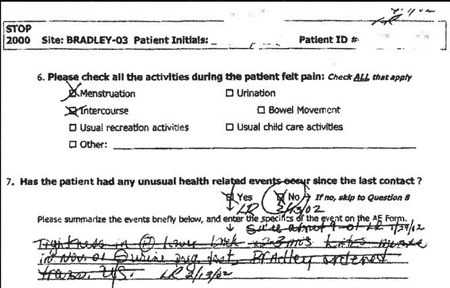Essure PMA Was Fraudulent, Patient Group Says
January 8, 2016
Members of the Essure Problems group, which has more than 25,000 members, contend that Bayer's Essure birth control device is dangerous, ineffective, and was fraudulently brought to the market.
Brian Buntz
|
During the clinical trial for Essure, Hudak had initially reported unusual health-related problems only have them crossed out at a later date. |
At a PMA meeting related to the Essure birth control device in 2002, one of the panel members, David B. Seifer, MD, asked what would theoretically happen if the device was not as effective at preventing pregnancy as its manufacturer had hoped. "The private investigators would find each of us, bring us back here, and ask us why we approved this," joked Subir Roy, MD.
At that time, only one- and two-year contraceptive efficacy data was available for the device, which was approved by FDA in 2002. A more recent Yale study determined that women treated with the device are more than four times likely to get pregnant than those treated with more traditional laparoscopic tubal ligation. Some patients face problems with metal toxicitiy, potentially-lifelong autoimmune problems, headaches, fatigue, while a handful of people have died from complications tied to the product, which was developed by Conceptus and is now marketed by Bayer. Women treated with the device in their 20s and 30s are getting total hysterectomies while other struggle to find doctors to remove the product.
While Bayer insists the product is safe, there is evidence that some of the clinical trial participants records linked to the PMA application were altered to show favorable results for the controversial birth control device according to members of the EssureProblems group. Bayer disputes this.
Kim Hudak, who was involved in the clinical trial used to convince FDA to approve the device in 2000, says she has obtained the medical records related to the device in 2013 and says they were clearly altered. At least two other women report that their records were altered to delete reports of pain and other problems, according to a report from NBC New York. One patient reported severe pain while researchers reported that her comfort level was "excellent." Another reported "sharp pain," but the clinical trial documents indicate that her comfort level was "very good."
"After I received my records, I spent about a week in absolute shock about what was in there and wasn't; it was ridiculous," Hudaksays. "I thought: "What patient is this? This is definitely not me.'"
While two other members of the EssureProblems group have also obtained their altered medical records, although Hudaksays hers was revised the most.
"I reported pain and they crossed it out in the records," Hudak says. "I also reported problems that problems that never got documented. In all, about 75% of the symptoms I mentioned to the nurses didn't make it onto the Conceptus form. When I mentioned a problem, they would say: 'oh, we don't think that was related to the device.'"
"When I was in the clinical trial, I started to have health problems that I reported to the doctor," Hudak says. "This really well-respected doctor said: 'your health problems have nothing to do with this device,' He referred me to a specialist who said: there is something wrong with you but we don't know what it is. Bear in mind I was healthy prior to the surgery."
Some of the patients involved in the clinical trials reported that researchers coached their answers.
Because the Essure device was approved under FDA's most rigorous PMA process, injured parties are effectively barred from filing lawsuits because the FDA has given its good housekeeping stamp of approval that the device is safe and effective and the benefits of using the device are outweighed by any risks. "Obviously, we are hoping that FDA is going to change its position on the safety and effectiveness of the Essure device," Hudak says.
FDA had cited Conceptus, the initial maker of Essure, for multiple deficiencies in 483 documents, including problems with design outputs, CAPA documentation problems, and the failure of the company to report adverse events, including two reports of bowel perforation related to insertion of the device. The 483 states that there were at least 41 reports of perforation--primarily of the uterus and fallopian tubes--related to the device from July 12, 2010 to December 10, 2010. As of January 6, 2011, FDA states that there were 508 complaints of perforation.
The 483 documents also report quality problems related to the microinsert coil catheter.
FDA has announced that it will make an announcement regarding Essure by the end of February.
Learn more about cutting-edge medical devices at MD&M West, February 9-11 at the Anaheim Convention Center in Anaheim, CA. |
About the Author(s)
You May Also Like


.png?width=300&auto=webp&quality=80&disable=upscale)
